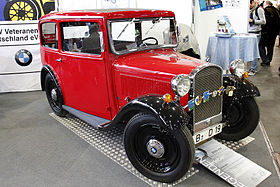BMW 3/20
| BMW 3/20[1] | |
|---|---|
 | |
| Overview | |
| Manufacturer | BMW |
| Also called | AM-1, AM-2, AM-3, AM-4 |
| Production | 1932–1934 |
| Assembly | Germany: Eisenach |
| Designer | Alfred Böning |
| Body and chassis | |
| Class | City car |
| Body style | four seat saloon four seat cabriolet two seat convertible coupé |
| Layout | FR layout |
| Powertrain | |
| Engine | 788 cc (48.1 cu in) OHV straight-4 |
| Transmission | 4-speed manual |
| Dimensions | |
| Wheelbase | 2,150 mm (84.6 in) |
| Length | 3,200 mm (126 in) |
| Width | 1,420 mm (56 in) |
| Height | 1,550 mm (61 in) |
| Kerb weight | 650 kg (1,433 lb) with saloon body |
| Chronology | |
| Predecessor | BMW 3/15 |
| Successor | BMW 309 |
The BMW 3/20 PS was the first BMW automobile designed entirely by BMW. It was manufactured from 1932 to 1934, replacing the 3/15 model that was initially an Austin 7 manufactured under licence from the Austin Motor Company.

The engine used in the 3/20 was based on the Austin Seven engine used in the 3/15, but its crankshaft ran in plain bearings instead of roller bearings and had an 80 mm (3.1 in) stroke, generating a displacement of 788 cc (48.1 cu in).[1] The new engine design also had a water pump and an overhead valve cylinder head. These design changes caused the engine to generate 20 hp, but did not change the taxable horsepower rating of 3 PS, thus giving the model designation 3/20.[2]
The 3/20 was larger than the 3/15, with an 84.6 in (2,149 mm) wheelbase and a body 3 in (76 mm) lower than the 3/15.[2] The 3/20 used a backbone frame unrelated to the 3/15's Austin Seven "A" frame.[3][4] It inherited the 3/15 DA-4's independent front suspension and added a swing axle independent rear suspension, using a transverse leaf spring similar to that used at the front.[1][4] The standard bodies for the car were built by Daimler-Benz in Sindelfingen.[1][4]
Journalist and engineer Josef Ganz, who had criticized the 3/15 DA-4's suspension system in the magazine Motor-Kritik,[5] was contracted in July 1931 as a consultant in the design of the 3/20 AM-1.[citation needed]
Four versions of the 3/20 were built: AM 1, AM 2, AM 3 and AM 4, where AM denoted Automobil München.[1]
References
[edit]- Citations
- Sources
- Noakes, Andrew (2005). The Ultimate History of BMW. Bath, UK: Parragon Publishing. ISBN 1-4054-5316-8.
- Norbye, Jan P. (1984). BMW - Bavaria's Driving Machines. Skokie, IL: Publications International. ISBN 0-517-42464-9.
- Robson, Graham (2008-11-07). "The First Cars—Dixi, BMW, and Advanced Engineering". Inside the BMW Factories: Building the Ultimate Driving Machine. Minneapolis, MN US: MBI Publishing. p 36 The development of the 3/20. ISBN 978-0-7603-3463-8. Retrieved 2013-02-15.[permanent dead link]
- "BMW's Early History". unixnerd.demon.co.uk. Archived from the original on 23 February 2008. Retrieved 2008-02-18.
- Ganz, Josef (February 1931). "Die Schwingachse des Kleinen". Motor-Kritik (in German) (3).
